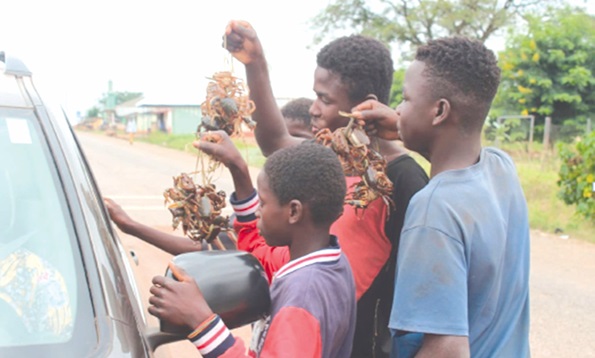IT is common to witness children in rural communities hunting for crabs along river banks for fun and not as a business venture.
However, in recent times, the harvesting of crabs has become a growing business and lucrative venture for some children in the Bono Region.
These little children, aged between nine and 16 years after visiting the river banks to hunt for crabs, sell their catch along the highway, particularly to chop bar and restaurant operators.
Among the communities where one can find these ‘crab-catchers’ are Chiraa and Kobedi in the Sunyani West Municipality, as well as Ayigbe in the Wenchi Municipality.
As farming communities close to river bodies, crabs are usually found in holes along the banks and sometimes in the rivers, allowing children to hunt for them to make money.
Trading point
These communities have become trading points for crab lovers who usually stop to make some purchases.
The crab sellers always rush in their numbers when a car stops and sell five crabs, which have been tied together, between GH¢10 and GH¢15 depending on their sizes.
Selling crabs along the highway started slowly at Ayigbe in 2018, but has flourished to become a competition among children staying in towns along the Sunyani-Techiman highway.
Hunting methods
Elsewhere, crab hunters use traps and nets for their catch, but in the three Bono communities, they are hunted without traps or nets.
The hunters dig holes in particular spots suspected to have crabs and when they find them they put their bare hands in the holes to catch them.
The elderly among them sometimes do not dig. Instead, they clear the bush around the holes and dip their bare hands into the holes for their catch.
Others, particularly the little ones and those afraid the crabs may hurt them, pour hot water in the holes to force them out.
Dangerous reptiles
Even though these children are sometimes attacked or exposed to dangerous reptiles such as snakes and scorpions, they have not given up as they go each day, especially during vacation, on their crab hunting expeditions.
A 15-year-old boy at Kobedi, Frederick Sanpana, told the Daily Graphic that although they were aware of the danger posed by dangerous reptiles, they could identify or differentiate between crab holes and other holes.
Sanpana said on a good day, he could catch more than 50 crabs to make about GH¢100.
He said he and his counterparts normally went hunting after school, on Saturdays and Sundays and used part of the money they made to buy reading and exercise books and food and support their parents to feed their families.
Some parents are said to have influenced their wards to go and hunt for crabs or hunt for them to sell, especially when they have no money.
However, a parent at Kobedi, Samuel Kwame, told the Daily Graphic that though hunting for crabs was a lucrative business for some children in the area, he would not allow his children to engage in it.
Simple to catch
Another child at Ayigbe, Kofi Asare, said catching crabs during the rainy season was simple, explaining that some of the crabs were normally found hiding in the sand.
He explained that he sometimes used a stick to identify them under the sand, saying: “If the sand is soft, it makes it easier to catch them.”
Asare said catching a crab with the hand in its hole was simple, explaining: "You need to hold the back of the crab to avoid their sharp claws."
Crabs usually dig sand to build their home nest, which is about half a metre deep, depending on the size of the crab.
They are normally found in rivers and muddy areas, where they could spend a day digging and bringing out sand from the hole to create home nests for themselves.
Checks showed that eating crabs has several benefits such as prevention of cancer, promotion of healthy teeth and bones, improvement of health and boosting of mental activity.
It is also a good source of protein, facilitates wound healing, regulates cholesterol levels, prevents blood clotting and increases blood circulation, among others.
Writer's email: biiya.ali@graphic.com.gh

